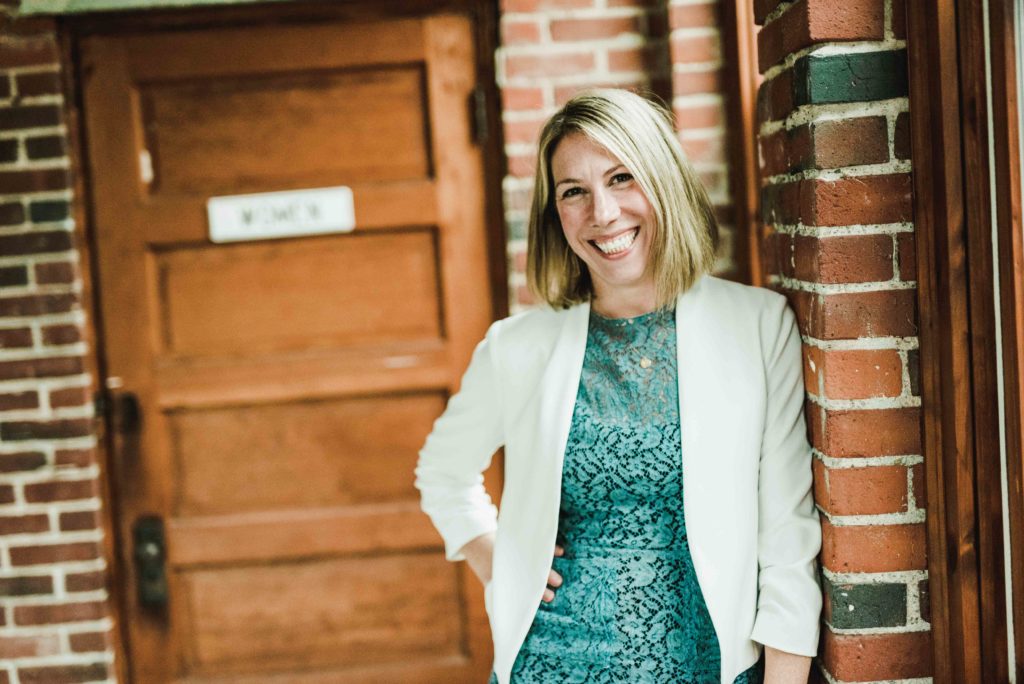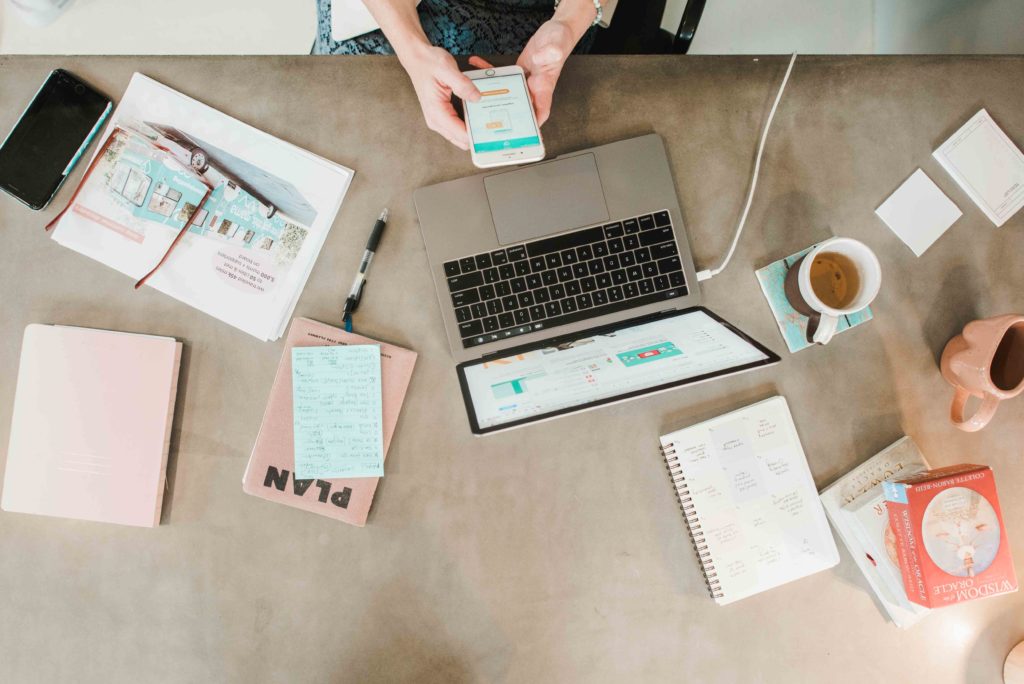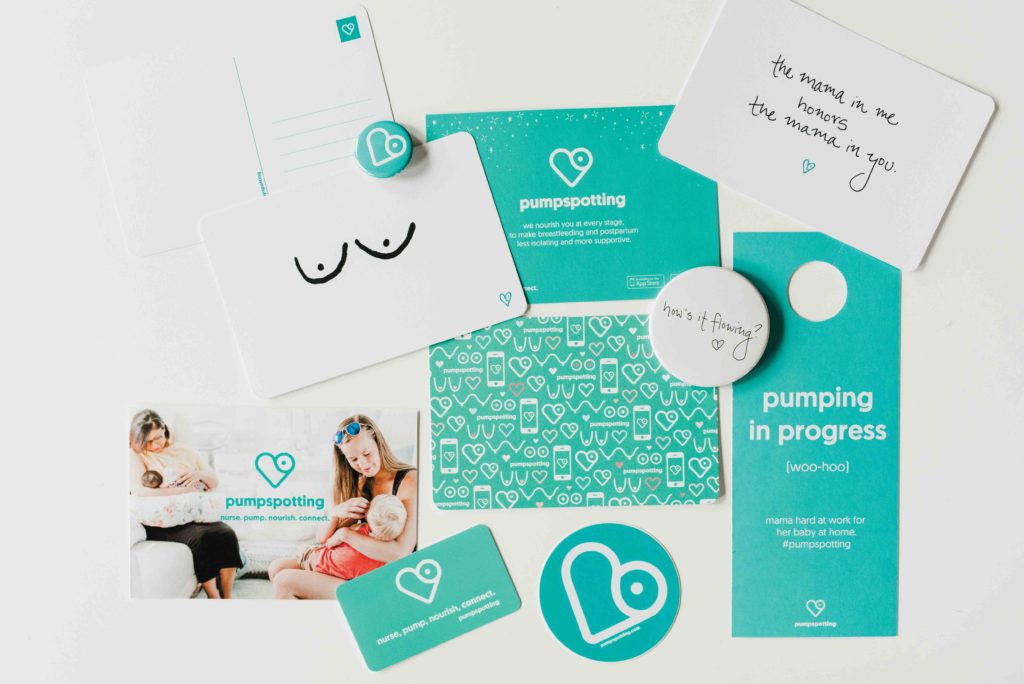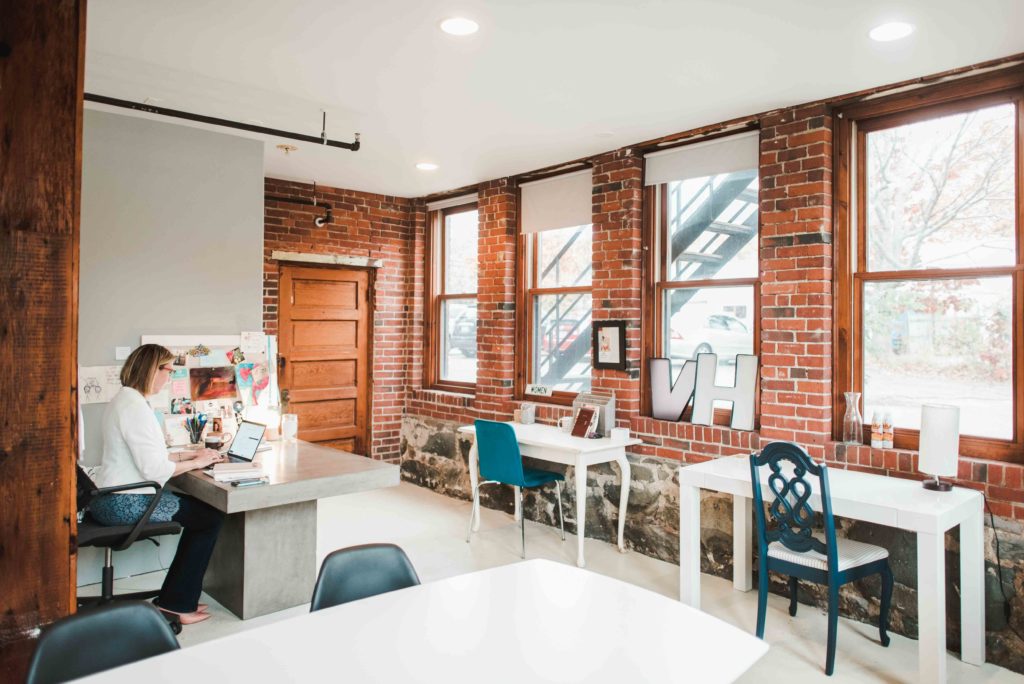Breast Friends
How a social-media marketer with an MFA in creative writing has united breastfeeding moms in Maine and beyond.

Amy VanHaren sat slumped on the San Francisco airport bathroom floor and cried. Here she was, again, pumping breastmilk while waiting to board a red-eye to return to her family in Eliot. Another work trip in a long line of work trips meant pumping and pouring and mailing home (on dry ice) the elixir she was determined to feed baby Max. When her first child, Emma, was born, VanHaren had had a maternity leave from a job without travel, but now, two years later, she was out there, the 37-year-old sole executive of VanHaren Creative, a social-media marketing company with clients all across the country. She had learned to pump everywhere: between seatmates on flights, under tables, in an Uber. On this dirty, dank floor, as the machine whirred and nearby toilets flushed, she had never felt so alone.
Why, she wondered, does breastfeeding have to be so hard? And then it struck her.
Thunderbolt 1
Whenever VanHaren talked with other moms, she felt better, comforted in knowing that others recognized breastfeeding’s time commitment (roughly 1,800 hours in the first year alone), logistics (locating a spot to pump when away from home), and complications (mastitis, latching issues, low milk supply). Why not, she thought, connect nursing mamas through technology? Why not create a tool that allows women to vent, ask questions, and find support—as well as locate a comfortable place to whip it out. An app, VanHaren thought, to get us off the bathroom floor.
But how? VanHaren has an MFA in creative writing, not an MBA. She specializes in social-media marketing, working first for Stonyfield and then on her own for companies such as Patagonia and Amy’s Kitchen. She knew how to promote an existing product, but not how to create a new one. She knew nothing about building an app.
And so she networked, testing her idea on anyone who would listen. As entrepreneurs know, one person can turn things around. For VanHaren that one person was her yoga instructor, who after class one day shared with VanHaren the name of a San Francisco app developer she had met at a yoga retreat. VanHaren jumped at the connection, phoning Lindsey Witmer Collins, then sending Witmer Collins PowerPoint slides outlining her vision for the app she called Pumpspotting, with its tag line “nurse, pump, nourish, connect.”

“Brilliant,” Witmer Collins responded, and Pumpspotting grew from one to two: VanHaren with her wide smile, and soft-spoken Witmer Collins. On the first try, Witmer Collins designed the logo, described by VanHaren as “a boob in a heart.” Together, they plotted the app’s features: daily inspirational messages, a chat room, and a Yelp-like function that recommends the best places to pump and breastfeed in airports, restaurants, public parks, and malls. Instead of stars, the app rates in babies. Three babies means “whip it out,” two babies says “got you covered,” and a lone baby warns “beware the stares.”
On the app’s launch day in June 2016 VanHaren waited for the downloads from her Kittery office. “What if we were wrong?” she wondered. Then came the first download, then another, then a steady stream. By day’s end, Pumpspotting had been downloaded 498 times, or as VanHaren says, “996 boobs.” That number would eventually grow to 25,000.
Among the early users was Christine Patey, a new mom in Saco. Born with tongue and lip tie, her daughter Alice couldn’t latch, which meant Patey pumped, and pumped. Every few hours. Day and night. Even after the surgery that freed her tongue and lip, Alice needed to learn how to suck, which meant patience. And pumping. Patey was exhausted and depressed. She wanted to quit. And then came the message on Pumpspotting’s daily mama feed: “However you feel this week, may you remember one simple thing: you are doing it.”
“I am doing it,” Patey thought. “I have reason to be proud.” She persevered, Alice grew stronger, and, at almost one and a half years old, she nurses still.
Thrilled by their early success but eager to gain a wider audience, VanHaren and Witmer Collins appeared on Planet of the Apps, a reality show on Apple Music that VanHaren describes as a cross between The Voice and Shark Tank. They made it through the initial pitch—delivered on a moving escalator—but faltered during the 45-minute grilling by the four celebrity judges, who included Gwyneth Paltrow. It was, however, media mogul Gary Vaynerchuk’s question, “How well do you know the women you want to serve?” that pricked at VanHaren all night, as she and Witmer Collins drank tequila to soften the rejection, and early the next morning when they awoke, hungover and dehydrated, in their hotel room.
How well did they know their audience? Pumpspotting had sprung out of VanHaren’s desperation, but what did she really know about moms from Lewiston to Laguna? “We’ll find out!” VanHaren announced to Witmer Collins. “We’ll take the app on the road.”
Thunderbolt II
The idea was to buy a bus and drive cross-country, talking to moms, learning what support they sought. But what, VanHaren thought, do I know about buying a bus, driving a bus, and maintaining a bus? She, however, “is an indomitable force of nature,” as Witmer Collins says, and her determination propelled them forward. They bought Barb, a 23-year-old Safari Continental, from friends of Witmer Collins. They funded Barb’s renovation—comfy spaces for lounging on the inside and a turquoise exterior with boob art and Pumpspotting logos—with a $41,000 Kickstarter campaign.

The Breast Express launched in April 2018, funded by sponsors from Dr. Bronner’s to Barney Butter. Its first stop was MIT’s “Make the Breast Pump Not Suck,” a hack-a-thon focused on better pump designs. Then it moved on to Maine. “The faces of the moms glowed as they stepped onto the bus at the Blue Mermaid in Kittery,” says Andrea Rutherford of Seacoast Birth Matters.
“They couldn’t believe that they were entering this sanctuary that was all about them.”
Barb’s first tour rolled through 40 cities in six months, stopping at baby shows, hospitals, birth centers, and women’s homes, with VanHaren honoring as many of the 500 visit requests as she could. Although VanHaren desperately missed her husband and her kids, who could only occasionally fly to meet up with her, she marveled at her own learning curve. She tackled broken wind-shields and failed brakes. She conquered emptying the septic. And the more mamas she met, the more conversations she had, the clearer was Pumpspotting’s next step.
Thunderbolt III
Although federal law dictates that employers must provide a
space and time for employees to express milk, the women lounging in Barb
described tiny closets with nothing but one chair, clock-watching supervisors,
and no refrigeration. VanHaren sensed the problem was lack of education rather than
malice. Employers needed to learn that, if they encouraged breast-feeding,
they’d enjoy better retention and lower absenteeism. Breastmilk builds the
immune system; healthier babies mean fewer sick days and also fewer medical
insurance claims. Savings for employers abound.
VanHaren imagined a corporate lactation program that helps employers create breastfeeding-friendly workplaces and connects nursing employees. The cost, however, would be formidable. What did she know about that level of fundraising, about venture capital?

Cushioned by a growing staff at VanHaren Creative, she enrolled in startup accelerator programs. She earned accolades and awards, including $75,000 from PepsiCo at Mass-Challenge in Boston, a solid start toward her $1.2 million goal. She talked to companies, networked at conferences, and joined forces with the Maine State Breastfeeding Coalition. While Pumpspotting aims to unite women across the nation, VanHaren is focused on her home state. Beyond connecting Maine moms, she knows that, by growing her business and by hiring local workers, she is growing Maine’s economy. And that’s why the corporate lactation program appealed to Maine Venture Fund, which requires that at least 50 percent of the business be based in Maine, and the Maine Angels, an organization of individuals in Maine who invest in and mentor early-stage companies. Both are in late-stage conversations with VanHaren about investment options.
Driving to Portland one recent fall night to share her corporate lactation program with a small group of women investors in a condo overlooking Casco Bay, VanHaren muses about the skills her Pumpspotting ideas have demanded she acquire. One is foremost on her mind this evening: the art of pitching. While she has developed a mastery of the tagline and the PowerPoint, she knows that a yes is not guaranteed, that the journey to the check is long and bumpy. Still, she says, the process is a high: “It is the imagining and creating something that’s never been done before that drives me.”

